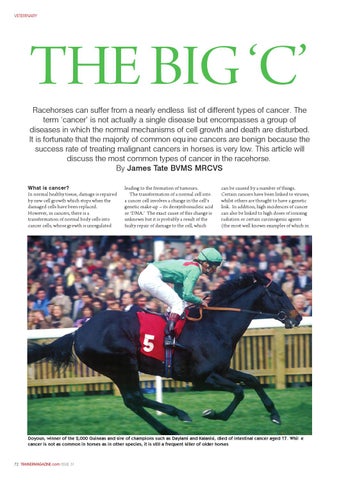cancer issue 31.qxd:Jerkins feature.qxd
19/8/10
20:44
Page 1
VETERINARY
THE BIG ‘C’
Racehorses can suffer from a nearly endless list of different types of cancer. The term ‘cancer’ is not actually a single disease but encompasses a group of diseases in which the normal mechanisms of cell growth and death are disturbed. It is fortunate that the majority of common equ ine cancers are benign because the success rate of treating malignant cancers in horses is very low. This article will discuss the most common types of cancer in the racehorse. By James Tate BVMS MRCVS What is cancer? In normal healthy tissue, damage is repaired by new cell growth which stops when the damaged cells have been replaced. However, in cancers, there is a transformation of normal body cells into cancer cells, whose growth is unregulated
leading to the formation of tumours. The transformation of a normal cell into a cancer cell involves a change in the cell’s genetic make-up – its deoxyribonucleic acid or ‘DNA.’ The exact cause of this change is unknown but it is probably a result of the faulty repair of damage to the cell, which
can be caused by a number of things. Certain cancers have been linked to viruses, whilst others are thought to have a genetic link. In addition, high incidences of cancer can also be linked to high doses of ionising radiation or certain carcinogenic agents (the most well known examples of which in
Doyoun, winner of the 2,000 Guineas and sire of champions such as Daylami and Kalanisi, died of intestinal cancer aged 17. Whil e cancer is not as common in horses as in other species, it is still a frequent killer of older horses
72 TRAINERMAGAZINE.com ISSUE 31
